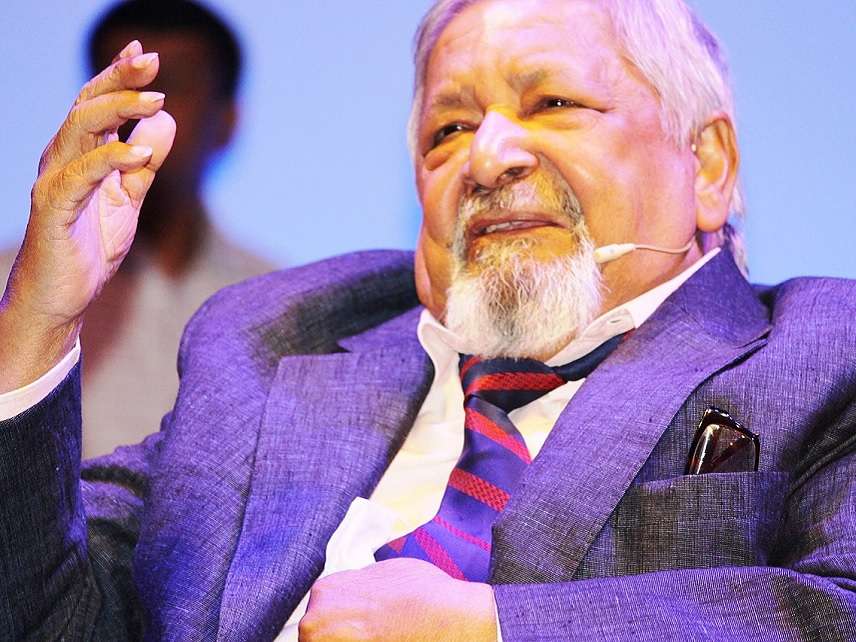V.S. Naipaul: 'Terrorists Can Fly a Plane, But What They Can't Do Is Build a Plane'
The Nobel laureate had a brilliant, sadly ignored insight that would have short-circuited the worst cultural and political reactions of the past 17 years.

V.S. Naipaul, winner of the 2001 Nobel Prize for Literature, has died at the age of 85. He was born and raised in Trinidad and set many of his early novels there. South Asian Indian by ethnicity and a longtime resident of England, his novels and non-fiction works engage colonialism and typically level biting criticism at both the lordly and liberated classes. Raised as a Hindu who was a non-believer in his adult life, he was an early and vociferous critic of radical Islam.
His 1981 book, Among the Believers: An Islamic Journey, was controversial for its argument that radical Islam was merely the latest iteration of demonstrably failed revolutionary Third-World ideology and a potential source of global violence. Reason's reviewer, Paul Hornak, found Naipaul's book
a relentlessly pro-Western account of the delusion prevalent in four countries of the East: Pakistan, Malaysia, Indonesia, and Khomeini's Iran. Iran, despite its monumental failures, is taken as a guiding light by the other three. The author, V.S. Naipaul, talks to an eccentric selection of Muslims. A few of them sound like they've got a mean streak, but the "hanging judge," Khalkhali, comes across as genuinely dangerous. He boasts that he killed the Shah's prime minister. Another Iranian, a communist, calls Khomeini a petty bourgeois….
Naipaul concludes that the impoverished are swelling the ranks of Islam because it validates their preconceptions. They like its message—basically, that poor is beautiful. They like its authority. It organizes the affairs of a believer down to the level of small matters of personal hygiene. It is tough on infidels, who coincidentally are the believers' enemies in the secular realm. The Western businessmen, the successful immigrants, the native rich: all will perish in the purifying flame of Allah.
"Millions will have to die," says an otherwise placid Pakistani predicting the Islamic future. Naipaul thinks so too. In calling for "a society cleansed and purified," he says, the Islamic Jeremiahs seem to long for ruin.
Less than a year after 9/11 Naipaul said something about Islamic terrorists that was wise, accurate, and mostly ignored:
The idea of [the terrorists'] strength is an illusion….The terrorists can fly a plane, but what they can't do is build a plane. What they can't do is build those towers.
The point, of course, isn't that terrorists such as the ones behind the 9/11 attacks couldn't be dangerous and deadly, or even take over countries. It's that it's a mistake to equate them with existential foes against whom all aspects of modern society must be hardened and regimented. Donald Rumsfeld and other Bush administration officials and supporters called for exactly that sort of permanent soft-war footing, even calling the war on terrorism a "new Cold War." That fundamental mistake gave them a fiscal and moral blank check when it came to funding operations that were as morally sketchy as they were militarily ineffective (we're still in Afghanistan, aren't we?). On the domestic front, the overreaction Naipaul warned against had a similar, mostly unchecked impact. The 9/11 attacks, I wrote in 2002,
restructur[ed] American life in myriad ways, ranging from the innocuous (continued strong sales and displays of U.S. flags) to the bizarre (airport security guards forcing nursing mothers to drink their own milk as a condition of boarding a plane).
While 9/11 hardly killed libertarianism, as Francis Fukuyama dreamed a while back in the Wall Street Journal, it has sanctioned expansive government spending (even new and improved farm subsidies managed to hitch a ride on the Homeland Security gravy train) and even more expansive government action when it comes to denying due process (hey, what's up with "dirty bomber" Jose Padilla anyway?), spying on citizens, and stonewalling various sorts of open-government protections (a John Ashcroft specialty that had even the conservative mag Insight on the News yelling, "Bush Team Thumbs Its Nose at FOIA").
Will such policies remain in place after the current crisis plays out? If the past is any guide, it's likely that they will, as citizens forget what things used to be like (who remembers, for instance, exactly when you had to start showing photo I.D. to board domestic flights?). Given all that, we can look forward to a future filled with more headlines such as this chilling one from today's Washington Post: "Secret Court Rebuffs Ashcroft: Justice Dept. Chided on Misinformation."
I'll leave it to others more versed in his novels and essays to evaluate his place as a world author. But Naipaul was perfectly on target when it came to identifying the brilliant truth about Islamic terrorists' lack of real power and strength to bring down a world that continues to move, however imperfectly, toward the mix of markets, civil rights, representative rule, material progress, and general modernity that was once proclaimed as the "end of history."
As a society, we ignored Naipual's insight at seemingly endless costs that continue to sanction indefensible military actions abroad and mass surveillance and fear of immigrants at home. We are now well into a second decade of perpetuating a political, cultural, and strategic blunder that equates flying planes into buildings with the ability to destroy our way of life. If the latter is happening at all, it's not because of Osama bin Laden or his terrorist descendants.
